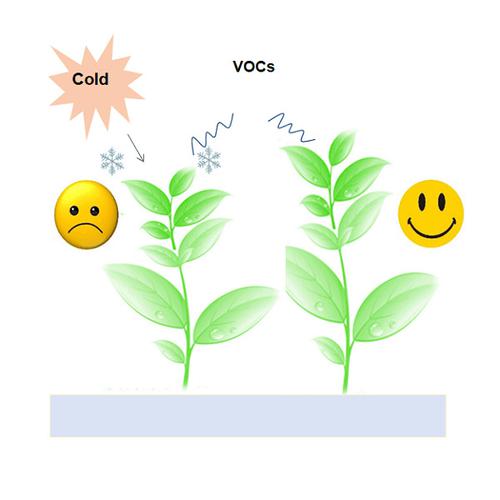当前位置:
X-MOL 学术
›
J. Integr. Plant Biol.
›
论文详情
Our official English website, www.x-mol.net, welcomes your feedback! (Note: you will need to create a separate account there.)
Induction of priming by cold stress via inducible volatile cues in neighboring tea plants.
Journal of Integrative Plant Biology ( IF 11.4 ) Pub Date : 2020-04-10 , DOI: 10.1111/jipb.12937 Mingyue Zhao 1 , Lu Wang 2 , Jingming Wang 1 , Jieyang Jin 1 , Na Zhang 1 , Lei Lei 2 , Ting Gao 1 , Tingting Jing 1 , Shangrui Zhang 1 , Yi Wu 1 , Bin Wu 1 , Yunqing Hu 1 , Xiaochun Wan 1 , Wilfried Schwab 1, 3 , Chuankui Song 1
Journal of Integrative Plant Biology ( IF 11.4 ) Pub Date : 2020-04-10 , DOI: 10.1111/jipb.12937 Mingyue Zhao 1 , Lu Wang 2 , Jingming Wang 1 , Jieyang Jin 1 , Na Zhang 1 , Lei Lei 2 , Ting Gao 1 , Tingting Jing 1 , Shangrui Zhang 1 , Yi Wu 1 , Bin Wu 1 , Yunqing Hu 1 , Xiaochun Wan 1 , Wilfried Schwab 1, 3 , Chuankui Song 1
Affiliation

|
Plants have evolved sophisticated defense mechanisms to overcome their sessile nature. However, if and how volatiles from cold‐stressed plants can trigger interplant communication is still unknown. Here, we provide the first evidence for interplant communication via inducible volatiles in cold stress. The volatiles, including nerolidol, geraniol, linalool, and methyl salicylate, emitted from cold‐stressed tea plants play key role(s) in priming cold tolerance of their neighbors via a C‐repeat‐binding factors‐dependent pathway. The knowledge will help us to understand how plants respond to volatile cues in cold stress and agricultural ecosystems.
中文翻译:

通过邻近茶树中的可诱导挥发性信号,通过冷胁迫诱导启动。
植物已经进化出复杂的防御机制来克服它们的固着性。但是,来自冷胁迫植物的挥发物是否以及如何触发植物间的交流仍然未知。在这里,我们提供了在冷胁迫下通过诱导性挥发物进行植物间通讯的第一个证据。冷胁迫茶树中释放出的挥发物,包括橙花醇,香叶醇,芳樟醇和水杨酸甲酯,在通过C-重复结合因子依赖性途径启动邻居耐寒性中起关键作用。这些知识将帮助我们了解植物如何应对寒冷胁迫和农业生态系统中的挥发性信号。
更新日期:2020-04-10
中文翻译:

通过邻近茶树中的可诱导挥发性信号,通过冷胁迫诱导启动。
植物已经进化出复杂的防御机制来克服它们的固着性。但是,来自冷胁迫植物的挥发物是否以及如何触发植物间的交流仍然未知。在这里,我们提供了在冷胁迫下通过诱导性挥发物进行植物间通讯的第一个证据。冷胁迫茶树中释放出的挥发物,包括橙花醇,香叶醇,芳樟醇和水杨酸甲酯,在通过C-重复结合因子依赖性途径启动邻居耐寒性中起关键作用。这些知识将帮助我们了解植物如何应对寒冷胁迫和农业生态系统中的挥发性信号。



























 京公网安备 11010802027423号
京公网安备 11010802027423号